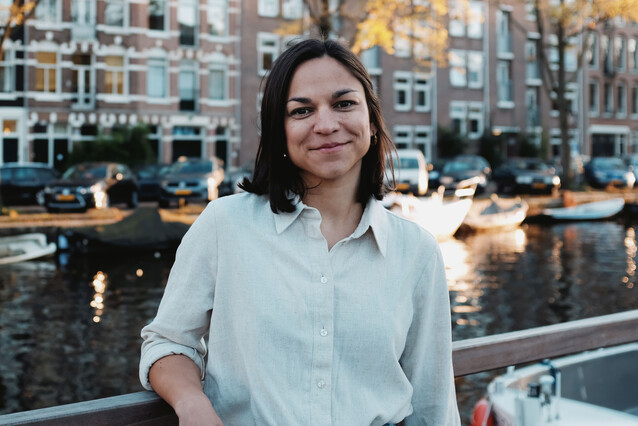Angelika Amon Young Scientist Award for Melanie de Almeida
Melanie de Almeida, a recent PhD graduate from the lab of Johannes Zuber, is among the first awardees of the Koch Institute’s Angelika Amon Young Scientist Award. Her outstanding doctoral research reflects Angelika Amon’s unstoppable passion for fundamental discovery. She will give a livestreamed presentation of her research on 17 November.
“Angelika Amon was an inspiring scientist, a dedicated mentor, and a relentlessly curious researcher. She embodied the motivation that drives all researchers working in discovery science,” says Jan-Michael Peters, IMP Scientific Director and long-standing friend of Amon. “Her legacy lives on at the IMP, and we are very proud that Melanie de Almeida is among the awardees of the Angelika Amon Award, as it closes a circle connecting IMP history and present.”
The Angelika Amon Young Scientist Award at MIT's Koch Institute is a prize established in 2021 to recognise the work of two PhD students in the life sciences. The awardees, only selected from institutions outside the United States, embody Amon’s infectious enthusiasm for fundamental science. Winners are invited to the Koch Institute and deliver scientific presentations to the MIT community and Amon lab alumni.
Melanie de Almeida, a recent PhD graduate from the lab of Johannes Zuber, is one of two young scientists to win the award. She worked in close collaboration with Matthias Hinterndorfer to develop a CRISPR-Cas9 screening assay that allows to systematically explore the regulation of important ‘cancer-drivers’ in malignant cells. Using this approach, they unexpectedly stumbled over a poorly characterised protein that was required for the degradation of all nuclear proteins. They subsequently resolved its function as the nuclear transport-factor of the cell's clean up machinery, the proteasome. The small protein AKIRIN2 forms two ‘fingers’ that pull the proteasome into the nucleus to maintain protein balance and get rid of unwanted nuclear proteins. The results of their research were reported in the journal Nature.
“I feel extremely honoured to receive this award. Our discovery of AKIRIN2's function is really the result of a combination of serendipity, as so often in science, as well as curiosity and the excitement of exploring something completely new,” Melanie de Almeida says. “The selection committee’s decision also recognises the vital contributions of Matthias Hinterndorfer – our discovery was a real team effort.”
Melanie de Almeida’s presentation will be livestreamed from the Koch Institute on 17 November 2022 at 8pm CET. Follow this link to attend.
After her doctoral studies, she started working as an analyst for a life sciences venture capital firm in Amsterdam, the Netherlands. “In our firm, we transform ground-breaking scientific discoveries into biomedical applications, and it’s really fascinating! I’m learning a lot and I’ve also realised that my doctoral training has given me a very solid base to build my career.”
About Angelika Amon and the IMP
Angelika Amon was one of the first students in the history of the IMP when she joined the lab of Kim Nasmyth in 1987. As the budding institute started to flourish, so did Angelika's career. After her master’s, she pursued a very productive doctorate in the same lab. In 1996, she went on to start her own lab at the Whitehead Institute and joined the Massachusetts Institute of Technology (MIT) in 1999. At the time of her untimely passing in 2020, she was a faculty member of MIT’s Koch Institute for Integrative Cancer Research, a Howard Hughes Medical Institute Investigator, and an Associate Member of the Broad Institute of MIT and Harvard. Amon’s research investigated the molecular mechanisms underlying mitosis and meiosis, and examined the effects of abnormal chromosome numbers on normal physiology and tumour development. Her work received many distinctions, including the 2019 Breakthrough Prize in Life Sciences.
Further reading
